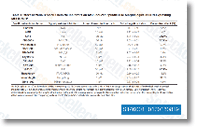In 61% of these ad enomatous polyps the transcript expression exceeded 100 fold relative to that of typical colon tissue. This observation gives you supportive evidence of a part of CCAT1 while in the early neoplasia stage of colon carcinoma pathogenesis. The acquiring of suggest CCAT1 expression in adenoma appreciably exceeding that of carcinoma additional supports this hypothesis, as it factors to a down regulating impact on CCAT1 expression when malignant transformation is attained. CCAT1 up regulation of five fold or greater in contrast to usual colon. Transcript up regulation was witnessed in 90. 1% of malignant major tumor samples obtained from sufferers with Stage I III colon adenocarcinoma. The fact that this non coding RNA is located on chromosome 8q24.
21, a sizzling spot for several cancer related single nucleotide polymorphisms, sup ports a position for CCAT1 in the tumorigenesis of colon carcinoma. Recent histopathological nodal staging techniques may possibly overlook occult lymph node metastases amounting to pathological underneath staging and below remedy. A lot of investigators have experimented with to enhance FAK inhibitor upon lymph node staging in sufferers with colon cancer. We analyzed lymph nodes from sufferers with colon cancer having ob vious macro metastasis by traditional histopathological staging for CCAT1 expression and compared this expres sion to that of damaging lymph nodes by histopathology obtained through the similar sufferers and to that of benign lymph nodes for individuals with no colon cancer. CCAT1 was highly up regulated in all 10 metastatic lymph nodes studied.
This kind of exceedingly substantial expression of CCAT1 might recommend an important position of this exceptional non coding RNA in regional lymphatic and nodal dissem ination of colon adenocarcinoma. Additionally, this fin ding can be utilized clinically for your detection of occult metastatic ailment in seemingly disorder PD0325901 391210-10-9 free regional lymph nodes of individuals undergoing surgical resection of colon cancer with curative intent. This would increase staging accuracy and individualized treatment method arranging, especially adjuvant systemic treatment in patients without any dal illness. Two from the most typical web-sites of metastatic spread of colon adenocarcinoma will be the liver and peritoneum. Hence, we integrated sufferers operated on for treat ment of metastatic disorder to these organ web pages in our research.
However, all patients were previously handled by systemic treatment, as a result, treatment method connected altera tions in CCAT1 expression can’t be excluded  in these pre taken care of sufferers. On the other hand, the sensible actuality is access to tissue of na ve patients with colon cancer metastatic towards the liver or peritoneum is limited, as it can be a distinctly unusual clinical situation because most patients are handled, in accordance to our proof based suggestions, with systemic therapy before surgical procedure for metastatic disorder. Taking this prospective bias into account, we showed that CCAT1 was up regulated in liver likewise as in peritoneal metastasis of colon cancer sufferers.
in these pre taken care of sufferers. On the other hand, the sensible actuality is access to tissue of na ve patients with colon cancer metastatic towards the liver or peritoneum is limited, as it can be a distinctly unusual clinical situation because most patients are handled, in accordance to our proof based suggestions, with systemic therapy before surgical procedure for metastatic disorder. Taking this prospective bias into account, we showed that CCAT1 was up regulated in liver likewise as in peritoneal metastasis of colon cancer sufferers.
No related posts.
